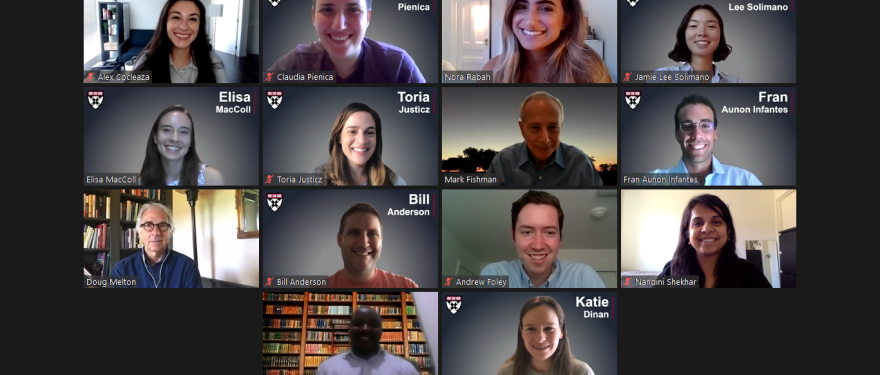Harvard’s new MS/MBA Biotechnology: Life Sciences joint degree program confers an MBA from Harvard Business School and a Master of Science from the Graduate School of Arts and Sciences and Harvard Medical School in the Harvard Department of Stem Cell and Regenerative Biology (SCRB), a Faculty of Arts and Sciences/Harvard Medical School joint department. The program is completed over two academic years, utilizing January terms and time in August at the start of the program. The inaugural cohort started in early August 2020 – here is an update from joint degree faculty on how the program is going so far.
Now that you have enrolled your first students, can you tell us how the program is going?
The program is going remarkably well! We were excited to welcome our inaugural class of 11 students. We first met collectively as a group on August 3rd with an orientation in the morning, followed by an afternoon session where we discussed two books, Bad Blood by John Carreyrou and The Immortal Life of Henrietta Lacks by Rebecca Skloot. We not only discussed scientific and business challenges brought up by the books, but also ethical dilemmas. It was a rich discussion and set the stage perfectly for our August course.
Initially, we planned to offer Lab Essentials as a hands-on lab course to immerse everyone back into the science, but with the coronavirus pandemic hitting globally, we realized that we had a unique opportunity to discuss the basic science and therapeutic potentials of a disease with a high unmet need, and so we put together a course on COVID-19, covering the science, medicine, and therapeutic aspects. It was an exciting academic experience for all of us, as we were discussing the major challenges being faced with leaders in the field who were deciding what best to do. We were so delighted at the level of engagement from the students. It was a great start to the program and provided wonderful momentum for the students as they enter their RC year.
The program seeks a diverse group of outstanding students who have an undergraduate degree in life sciences or medicine. Can you elaborate on that? For example, if I was a chemical engineer or a math major, does that mean I’m not eligible? How much biology do I need to be prepared for the program?
We really feel it is important for students in the program to have a solid understanding of the life sciences. Toward that end, we look for students who either majored in the life sciences or enrolled in coursework that would prepare them to write, think, and converse in the discipline. One simplistic litmus test could be whether a student has the knowledge of the topics covered in Molecular Biology of the Cell by Alberts et al.
Thus, to answer your question, it’s possible that a non-science major may be prepared if they have the necessary course background in molecular and cellular biology, whereby a student who majored in a biological science like ecology might not be as well prepared.
Can you tell us a bit about the professional backgrounds of the students in the first cohort?
Our initial cohort has a wide variety of professional backgrounds. In our first cohort, we have students who worked in such fields as strategic consulting, healthcare consulting, biotech, finance, health insurance technology platforms, medical devices, and the nonprofit sector. In short, students who entered the program had a mix of science and business work backgrounds, a mix which we seek and find valuable. All of our students have had at least two years of professional experience before starting.
What are you most looking forward to this academic year?
First and foremost, we are looking forward to getting to know our students even more this fall through meetings and the LSEM seminar. We will have another close bonding of our group in January via our intensive courses like Lab Essentials. We also are looking ahead to reviewing applications for next year’s group. This year’s cohort have already been wonderful ambassadors for the program, and we know they are equally as excited about welcoming next year’s group.
We would advise any of you reading who are interested to please apply! Each one of our students has a unique background in terms of prior academics, professional experience, and long-term goals, so there’s definitely no one-size-fits-all model for the “ideal candidate”. We hope to get a chance to welcome you to the program.

